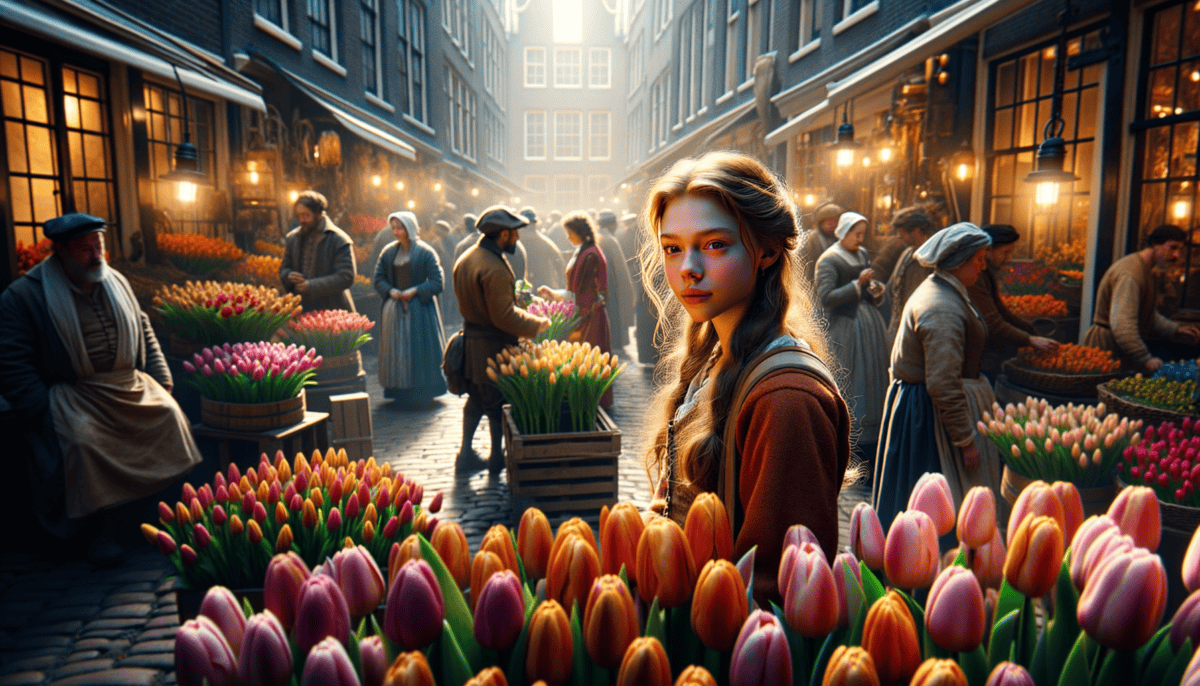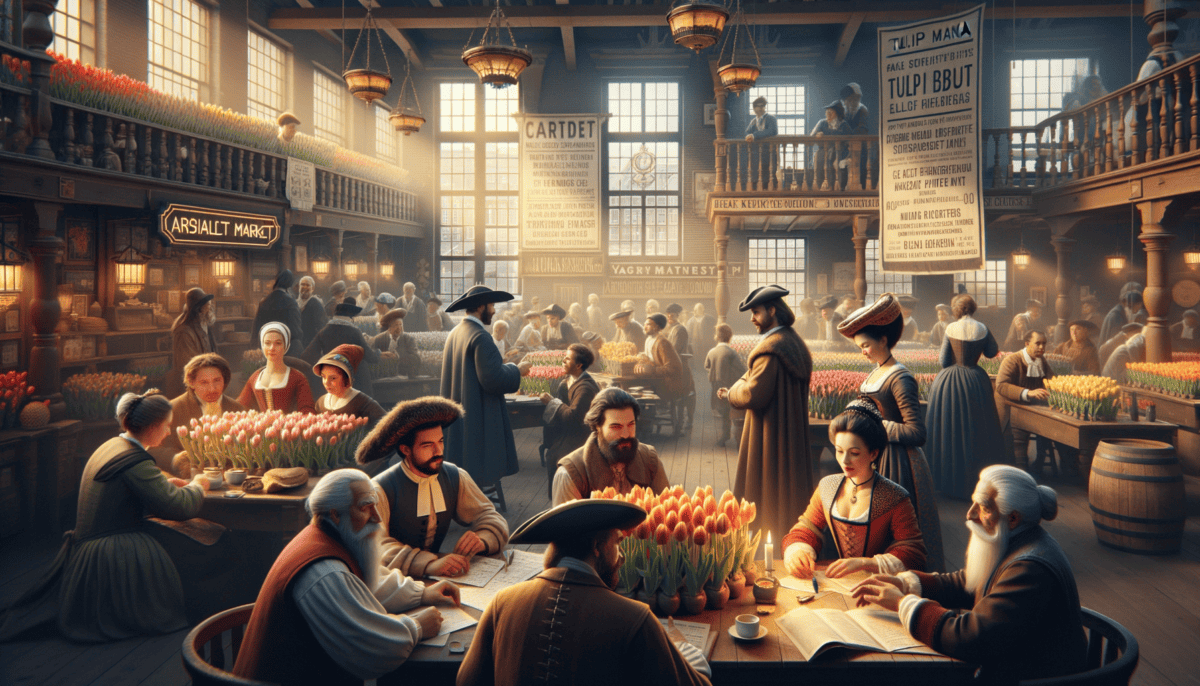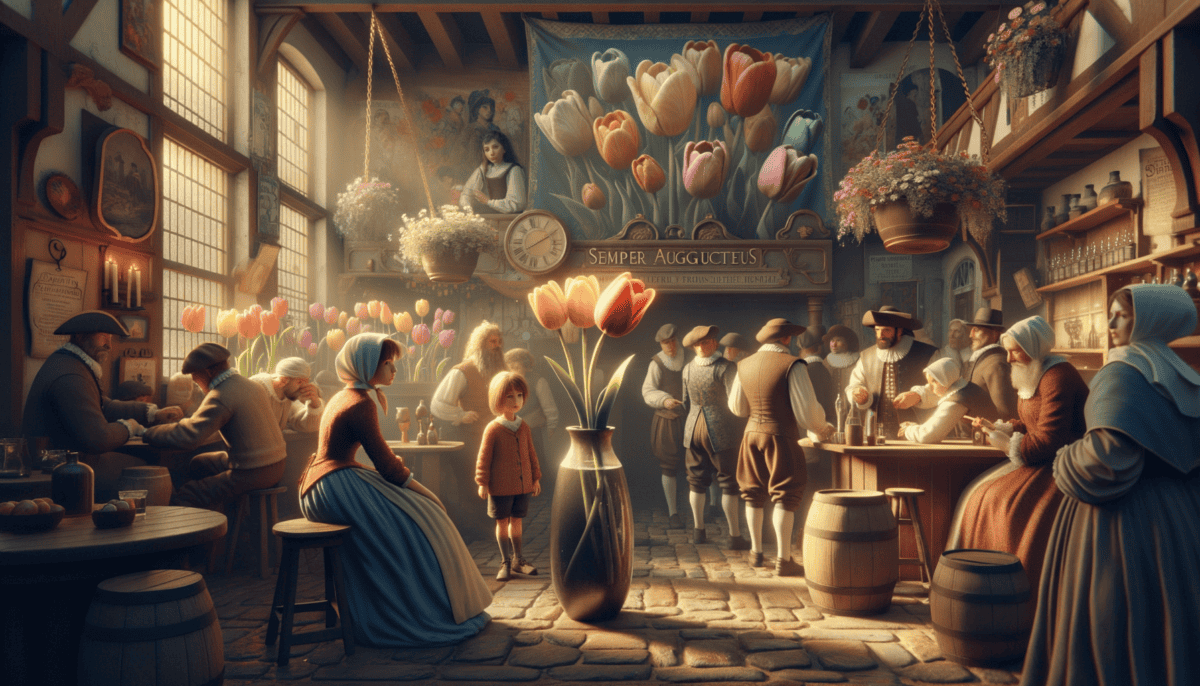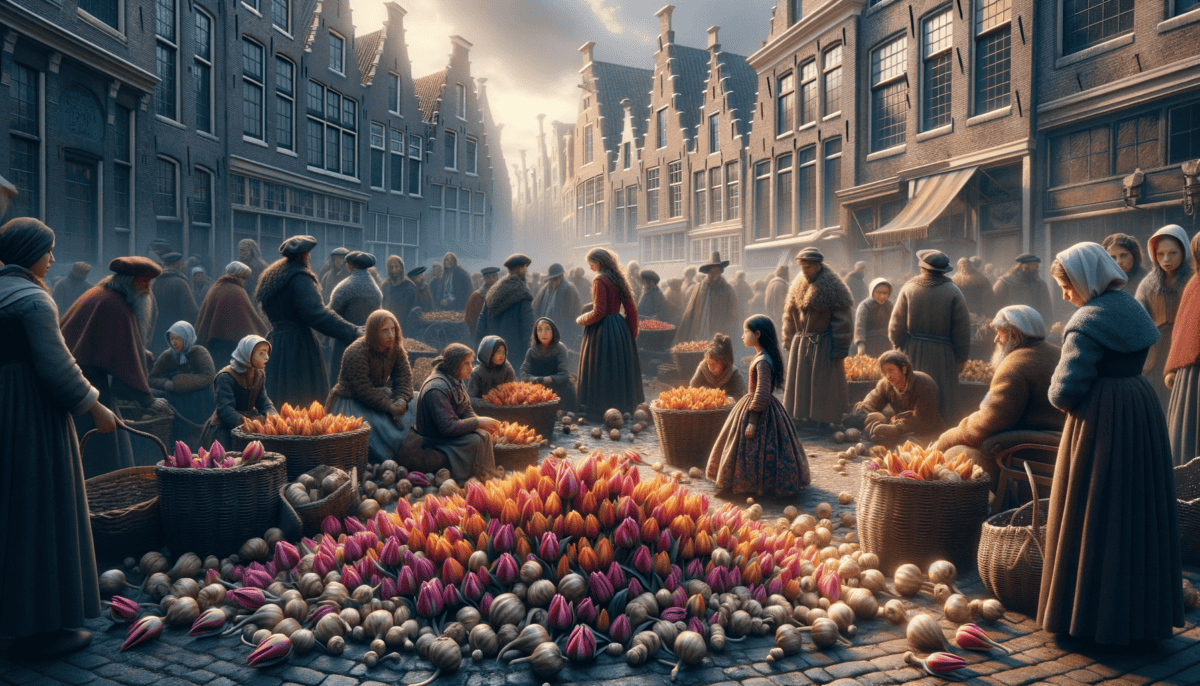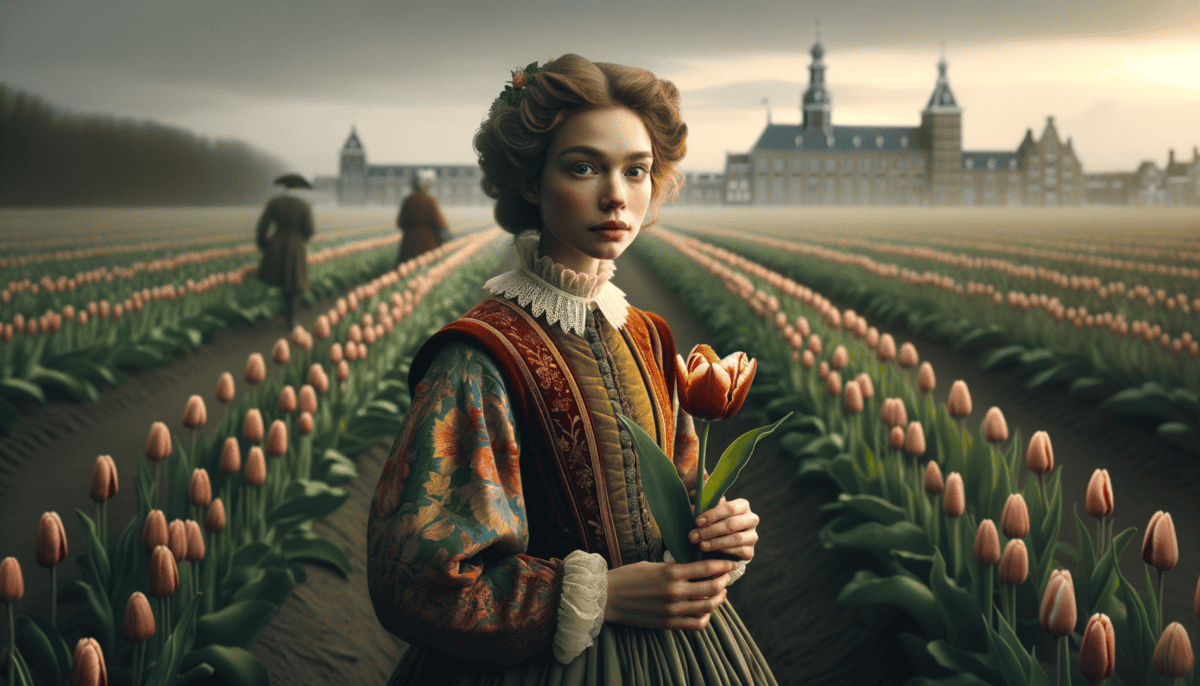Seeds of Desire
The morning sun peeked through the misty fields of Holland as young Anna Van Der Meer skipped between rows of colorful tulips. The year was 1634, and the flowers danced in the cool breeze like tiny bells ringing in spring.
"Papa, look at this one!" Anna called out, pointing to a striking red and yellow tulip. "It looks like it's wearing a fancy dress!"
Her father, Henrik Van Der Meer, smiled as he carefully tended to his precious flowers. "Ah, that's the Semper Augustus, my dear. It's the most special tulip in all of Amsterdam."
Anna gently touched the flower's soft petals. "Why is it so special, Papa?"
"Well, my little flower," Henrik said, wiping his hands on his apron, "these tulips came all the way from Turkey. They're like magic – no two are exactly the same, and some have patterns that look like they were painted by angels."
The air was filled with excitement in their small town near Amsterdam. More and more people were coming to see the tulips. Rich merchants in fancy clothes would visit their farm, pointing at flowers and writing in their notebooks.
"Did you hear?" whispered Mrs. Bakker from next door. "The De Vries family sold just one bulb for the price of their house!"
Anna's eyes grew wide. How could one little flower bulb be worth so much?
Here's what made these tulips so special:
- Their bright colors that no one had ever seen before
- The mysterious patterns on their petals
- How rare and hard to grow they were
- The way rich people loved to show them off
- Their beautiful shapes and sizes
"Times are changing, Anna," her father said, looking thoughtfully across his flower fields. "People say these tulips are worth more than gold now."
That evening, as Anna helped her mother prepare dinner, she could hear her father talking with visitors in their front room. The men spoke in excited voices about prices, contracts, and something called "bulb futures."
"Mama," Anna asked, "why do grown-ups get so excited about flowers?"
Her mother smiled knowingly. "Sometimes, dear one, people see something beautiful and rare, and they want it so badly that they forget about everything else."
As the sun set over their tulip fields, painting the sky in colors as vibrant as their flowers, Anna couldn't help but wonder what changes these beautiful blooms would bring to their quiet life in Holland. The air buzzed with possibility, like the bees that visited their garden each morning.
"Tomorrow," her father announced at dinner, "we're going to the market in Amsterdam. There's someone very important who wants to see our tulips."
Anna clutched her wooden doll tightly, feeling both excited and a little scared. Something big was happening – she could feel it in the way adults whispered, in the way their eyes sparkled when they talked about tulips, and in the growing number of fancy carriages that stopped at their farm each day.
That night, as she drifted off to sleep, Anna dreamed of fields filled with tulips that turned into gold coins under the moonlight. Little did she know that her simple life among the flowers was about to change forever.
Blooming Madness
The Amsterdam market bustled with more energy than Anna had ever seen. Merchants in fine silk coats huddled around tables, waving papers and shouting numbers. The smell of fresh bread and spices filled the air, but nobody seemed interested in food today.
“Three thousand guilders for the Admirael van der Eyck!” a man called out, his face red with excitement.
Anna tugged at her father’s sleeve. “Papa, why are they getting so excited about bulbs they can’t even see?”
Henrik patted her head. “You see, little one, they’re buying promises of tulips that haven’t even grown yet. It’s called trading futures.”
The tavern next door had become a makeshift trading house. Inside, people from all walks of life gathered around wooden tables:
- Rich merchants in fancy clothes
- Regular townspeople hoping to get rich
- Farmers like Papa
- Even the baker and the blacksmith
“Look there,” whispered Anna’s father, pointing to a well-dressed man. “That’s Master Van Houten. He used to make cheese, but now he trades only in tulips.”
Master Van Houten approached them with a broad smile. “Henrik! And this must be little Anna. I hear your Semper Augustus bulbs are the finest in all of Holland.”
Anna watched as her father and Master Van Houten moved to a quiet corner to talk business. Their voices grew excited as they discussed prices and contracts.
“Ten thousand guilders per bulb!” she heard her father gasp. Anna’s mother had told her that was more money than most people earned in ten years.
The next few weeks brought big changes. Their small farmhouse saw a parade of visitors, all wanting to buy their precious tulip bulbs. Papa spent less time in the fields and more time writing in his ledger.
“Mama,” Anna asked one evening, “why don’t we just sell all our tulips and become rich?”
Her mother looked worried. “Sometimes, my dear, things that seem too good to be true often are.”
One morning, Anna found her father staring at their tulip fields with an odd expression. “Papa, what’s wrong?”
“I’ve just sold next year’s bulbs for twenty thousand guilders,” he said softly. “But they’re still in the ground, not even grown yet.”
That evening, more neighbors arrived at their house. Even the butcher’s wife wore her best dress and talked about tulip investments. The room buzzed with excitement as people traded paper promises for tulips they’d never seen.
“Everyone’s getting rich!” declared the miller’s wife. “My husband sold one bulb and bought us a new house!”
But Anna noticed her mother’s worried frown as she served tea to their guests. Later that night, she heard her parents talking in hushed voices.
“Henrik, this can’t go on forever,” her mother whispered. “These prices make no sense.”
“Just a little longer,” Papa replied. “Think of the future we could give Anna.”
As winter approached, the trading grew even more frenzied. People no longer came to admire the beautiful flowers – they only wanted to buy and sell the precious bulbs. Anna missed the quiet days when tulips were just pretty flowers in their garden.
One cold morning, she found a note had been slipped under their door. It read: “Be careful. The wind is changing.” Anna gave it to her father, who crumpled it up quickly, but she saw the worry in his eyes.
That night, as snow began to fall outside her window, Anna dreamed of tulip petals floating away on the wind, turning into scraps of paper that dissolved in the dark.
The Peak of Tulip Mania
Snow blanketed Amsterdam as traders packed the Golden Tulip tavern. The warmth inside couldn’t match the fever of tulip trading.
“Sixty thousand guilders!” shouted a merchant, waving a contract. “For one Semper Augustus!”
Anna watched from her corner as her father negotiated with three merchants at once. His eyes sparkled with excitement, but dark circles beneath them showed his exhaustion.
“Papa hasn’t slept properly in days,” she whispered to her friend Maria, the innkeeper’s daughter.
“Nobody has,” Maria replied. “My father says people are trading houses for tulips now. Look at those fancy lords over there – they used to laugh at common folk, but now they’re trading with bakers and farmers!”
The tavern had transformed into something magical and strange. Where beer mugs once sat, precious tulip contracts now covered every table. People who’d never owned a flower in their lives now called themselves tulip merchants.
- Houses traded for bulbs
- Fancy clothes pawned for contracts
- Fortunes made overnight
- Promises written on paper
“HEAR YE! HEAR YE!” A town crier burst through the door. “A single Viceroy bulb just sold for the price of twelve fat cows and a new carriage!”
The crowd cheered. Anna noticed her mother standing in the doorway, her face pale with worry. More and more people were selling everything they owned to join the tulip trade.
“Look what I drew,” Anna said, showing her mother a picture. “It’s our old garden, remember? When we used to grow tulips just because they were pretty.”
Her mother hugged her tight. “Those were simpler days, weren’t they?”
That evening, Anna overheard Master Van Houten talking to her father: “The French are buying now too. The English can’t be far behind. We’ll all be richer than kings!”
But later that night, Anna found her father in his study, surrounded by contracts.
“Papa, are you worried?”
“No, no,” he said quickly. “Just keeping track. See these papers? Each one is worth more than our farm was last year.”
“But they’re just papers,” Anna said softly. “Where are the real tulips?”
Her father didn’t answer.
The next morning brought even wilder scenes. A sailor traded his ship for ten bulbs. A carpenter swapped his tools for a single rare tulip. People who’d never seen a real tulip were trading their life savings for paper promises.
Anna’s mother pulled her close. “Remember this, child. When people start trading things they don’t have for money they haven’t earned, trouble isn’t far behind.”
As winter deepened, the trading grew more frantic. Every night, the tavern stayed open later. Every morning, prices climbed higher. But Anna noticed something strange – fewer people were smiling now. Their eyes looked hungry, desperate.
“To the tulips!” they would cry, raising their glasses. But their laughter sounded hollow.
One evening, as snow fell outside, Anna found another mysterious note: “The higher the flower grows, the deeper it must fall.”
She tucked it away with the first one, watching the shadows of traders dance on the tavern walls, wondering how much higher this strange flower could grow.
The First Cracks
February’s icy winds swept through Amsterdam’s streets. Inside the Golden Tulip tavern, something felt different. The usual roar of trading had turned to whispers. ❄️
“Why isn’t anyone buying my Admirael van der Eyck?” a merchant called out desperately. “Yesterday it was worth a house!”
Anna watched as her father paced nervously. Three traders had promised to buy his tulip contracts, but none had shown up. Her mother’s words echoed in her mind: “Paper promises are lighter than air.”
“Something’s wrong,” Maria whispered, clutching Anna’s arm. “Did you see Master Willem? He tried to sell his entire collection this morning.”
“But why?” Anna asked. “He loves those tulips.”
“Papa says he needs real money – fast.”
The tavern’s atmosphere had changed. Where joy once filled the air, now worry clouded every face. People huddled in corners, comparing contracts and whispering about rumors from other cities.
| Yesterday’s Price | Today’s Price |
|---|---|
| 5,000 guilders | 4,800 guilders |
“It’s just a small drop,” traders assured each other nervously. “The market will bounce back tomorrow.”
But Anna saw fear in their eyes. She remembered the mysterious notes she’d found. Opening her secret box, she read them again:
“When flowers cost more than gold, winter isn’t far behind.”
“The higher the flower grows, the deeper it must fall.”
That evening, a merchant burst into the tavern, his face white as snow. “Haarlem’s market… it’s stopped trading! Nobody’s buying!”
Panic rippled through the room. Haarlem was the heart of the tulip trade. If their market was failing…
“It’s nothing!” shouted a wealthy trader. “I’ll buy every contract in this room!”
But Anna noticed he didn’t reach for his purse.
Her father came home late that night, his hands trembling as he sorted through his contracts. “Just a temporary setback,” he muttered. “Everything will be fine.”
The next morning, Anna found him still at his desk, surrounded by papers. When she looked closer, she saw they were old family records – deeds to their farm, letters about past harvests.
“Papa?” she asked softly. “What are you looking for?”
“Just remembering, dear one. Just remembering when we grew real flowers instead of trading paper ones.”
Outside, the wind howled louder. More alarming news arrived: prices had dropped in Rotterdam too. Traders who’d been bragging about their wealth yesterday now couldn’t find anyone to buy their contracts.
“Don’t worry,” they said, voices shaking. “Spring is coming. When the flowers bloom…”
But Anna remembered what her grandmother used to say: “Nature follows its own rules. No amount of wishing can make a flower bloom before its time.”
That night, as the tavern emptied early for the first time in months, Anna found a third mysterious note tucked beneath a windowsill:
“When dreams grow too big, the morning always comes.”
She watched as snow continued to fall outside, covering the empty streets where just days ago, crowds had gathered to trade their fortunes. The silence felt heavy with worry, like the calm before a storm.
Her father’s voice drifted down from his study: “Please, just one more day. The market will recover. It has to.”
But deep in her heart, Anna knew – something big was about to change. The question was: would their world shatter like ice in spring, or crumble slowly like leaves in autumn?
The Great Burst
The morning dawned cold and gray. Anna woke to shouting in the streets.
“The market has crashed! Nobody will honor their contracts!” The cry echoed through Amsterdam’s icy streets.
“This can’t be happening,” Anna’s father whispered, his face pale as he stared at his stack of worthless contracts. Just yesterday, they had been worth more than their farm. Now they weren’t worth the paper they were written on.
At the Golden Tulip tavern, chaos ruled. Merchants who’d been kings yesterday were paupers today.
“You promised to buy my bulbs!” shouted one trader.
“With what money?” came the bitter reply. “It’s all gone!”
“A flower’s beauty lasts a season, but its lesson lasts forever.”
Maria found Anna in the crowd. “My papa sold our house to buy tulip contracts,” she sobbed. “Now we have nothing.”
All around them, similar stories unfolded. People who’d traded their homes, farms, and savings for tulip promises watched their dreams crumble like dried petals.
| Before Crash | After Crash |
|---|---|
| One rare bulb = A grand house | One rare bulb = A common onion |
The city officials called an emergency meeting. They tried to calm the panic, but their words fell on deaf ears. How could paper promises fix broken dreams?
“Remember,” Anna’s mother said quietly, “we still have our farm. We still know how to grow real flowers.”
Her father nodded slowly, tears in his eyes. “We forgot what truly matters. We traded beauty for greed.”
That evening, Anna found one last mysterious note:
“In the end, a flower’s true worth lies not in its price, but in its ability to bloom again.”
Through the tavern window, Anna watched as merchants tore up their contracts. Some cried. Others sat in stunned silence. A few even laughed – the hollow laugh of those who’ve lost everything.
“What happens now?” she asked her father.
He took her hand gently. “We go back to the earth. We plant real bulbs instead of trading paper ones. We remember that true value grows slowly, like a flower in spring.”
In the following days, Amsterdam changed. The busy taverns grew quiet. The wealthy merchants disappeared. But in their gardens, the tulips continued to grow, unaware that they had shaken the world.
One morning, Anna found her father in their tulip field. He wasn’t counting contracts or dreaming of riches. He was simply tending the flowers, his hands deep in the soil.
“Look,” he said, pointing to a new sprout pushing through the earth. “This is real wealth. This is what we almost forgot.”
The great tulip bubble had burst, but something stronger remained: the simple truth that real value grows from patience, care, and wisdom. As winter slowly released its grip, Amsterdam began to heal, one garden at a time.
In her diary that night, Anna wrote:
“Sometimes we must lose everything to find what we never knew we had.”
The city would never be the same. But perhaps, Anna thought, watching the sun set over their tulip fields, that wasn’t entirely a bad thing. Sometimes the hardest lessons teach us the most important truths.
Wisdom Blooms Again
Spring returned to Amsterdam, painting the world in gentle colors. A year had passed since the great tulip crash. ✨
“Time heals all wounds, but memories plant wisdom.”
Anna stood in her family’s tulip field, watching new shoots push through the soil. The morning dew sparkled like tiny diamonds on their leaves.
“Look, Papa!” she called excitedly. “The Semper Augustus is blooming!”
Her father smiled, his eyes crinkling at the corners. “And this time, we’re growing it for the right reasons.”
The Golden Tulip tavern had changed too. Gone were the wild-eyed traders and their paper fortunes. Now it was just a quiet place where farmers shared gardening tips over cups of warm tea.
“Remember when people used to trade houses for bulbs?” Maria asked, joining Anna in the garden.
“It feels like a strange dream now,” Anna replied, gently touching a tulip petal.
| Then | Now |
|---|---|
| Trading paper promises | Growing real flowers |
Amsterdam had learned its lesson. The city still loved tulips, but differently now. People planted them in window boxes and small gardens. They gave them as gifts of friendship, not as investments.
“Mama,” Anna asked one evening, “do you think people will remember what happened?”
Her mother paused her knitting. “They’ll remember, dear one. And hopefully, they’ll be wiser for it.”
The mysterious note-writer left one final message in Anna’s garden:
“True wealth grows in gardens of contentment, not in fields of greed.”
As summer approached, tourists still came to see the Dutch tulip fields. But now they came to admire the flowers’ beauty, not their price tags.
Anna’s father had started teaching young farmers about responsible growing. “Remember,” he would say, “a flower’s worth isn’t in its rarity, but in the joy it brings.”
Many things changed in Amsterdam after the bubble burst. Some changes hurt, like saying goodbye to old dreams. But other changes brought new wisdom:
• Real value grows slowly
• Beauty is worth more than money
• Simple joys last longest
• True wealth blooms in the heart
One warm evening, Anna sat in her favorite spot by the tulip field, writing in her diary. The setting sun painted the flowers in golden light.
“The tulip bubble taught us all something,” she wrote. “It showed us that real treasure isn’t found in getting rich quick. It’s found in patient growing, honest work, and sharing beauty with others.”
Below her words, she pressed a perfect tulip petal, preserving it between the pages. Like the lesson of the great tulip bubble, it would stay there forever, reminding future readers that true value blooms naturally, one flower at a time.
As twilight settled over Amsterdam, the tulips closed their petals for the night. They would open again tomorrow, just as they had for centuries before, and would for centuries to come. Not as symbols of wealth, but as reminders of life’s simple, lasting treasures.
“And so the flowers taught us their greatest lesson: that beauty freely shared is worth more than beauty bought and sold.”


